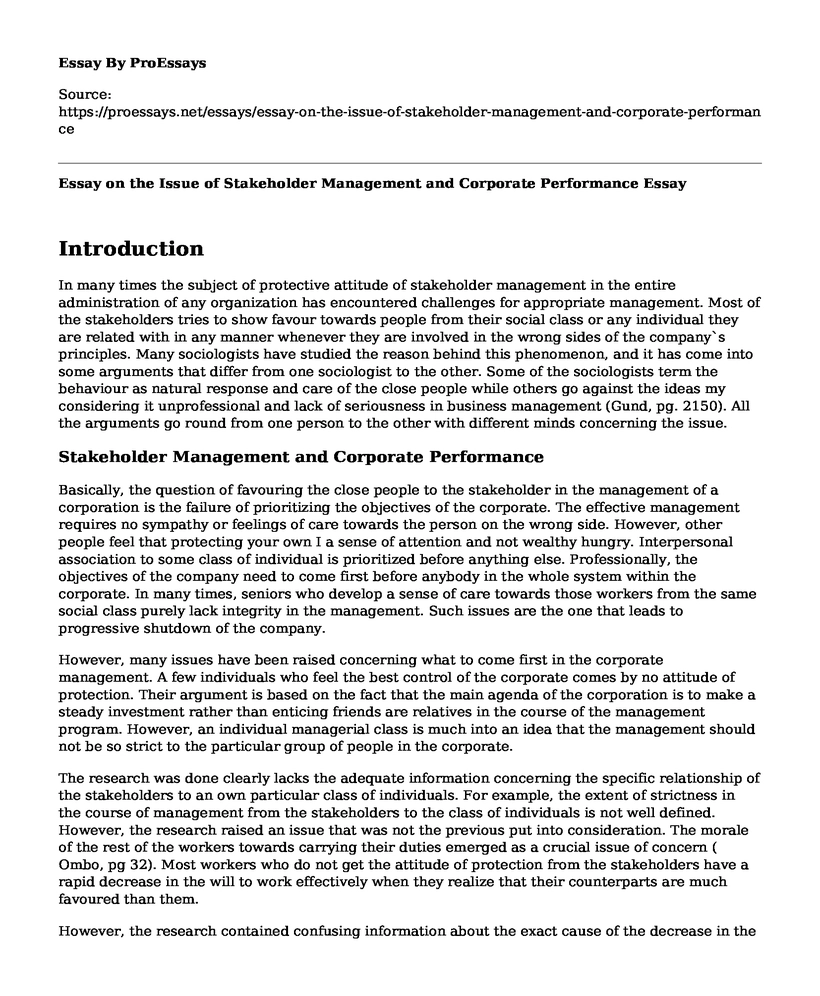Introduction
In many times the subject of protective attitude of stakeholder management in the entire administration of any organization has encountered challenges for appropriate management. Most of the stakeholders tries to show favour towards people from their social class or any individual they are related with in any manner whenever they are involved in the wrong sides of the company`s principles. Many sociologists have studied the reason behind this phenomenon, and it has come into some arguments that differ from one sociologist to the other. Some of the sociologists term the behaviour as natural response and care of the close people while others go against the ideas my considering it unprofessional and lack of seriousness in business management (Gund, pg. 2150). All the arguments go round from one person to the other with different minds concerning the issue.
Stakeholder Management and Corporate Performance
Basically, the question of favouring the close people to the stakeholder in the management of a corporation is the failure of prioritizing the objectives of the corporate. The effective management requires no sympathy or feelings of care towards the person on the wrong side. However, other people feel that protecting your own I a sense of attention and not wealthy hungry. Interpersonal association to some class of individual is prioritized before anything else. Professionally, the objectives of the company need to come first before anybody in the whole system within the corporate. In many times, seniors who develop a sense of care towards those workers from the same social class purely lack integrity in the management. Such issues are the one that leads to progressive shutdown of the company.
However, many issues have been raised concerning what to come first in the corporate management. A few individuals who feel the best control of the corporate comes by no attitude of protection. Their argument is based on the fact that the main agenda of the corporation is to make a steady investment rather than enticing friends are relatives in the course of the management program. However, an individual managerial class is much into an idea that the management should not be so strict to the particular group of people in the corporate.
The research was done clearly lacks the adequate information concerning the specific relationship of the stakeholders to an own particular class of individuals. For example, the extent of strictness in the course of management from the stakeholders to the class of individuals is not well defined. However, the research raised an issue that was not the previous put into consideration. The morale of the rest of the workers towards carrying their duties emerged as a crucial issue of concern ( Ombo, pg 32). Most workers who do not get the attitude of protection from the stakeholders have a rapid decrease in the will to work effectively when they realize that their counterparts are much favoured than them.
However, the research contained confusing information about the exact cause of the decrease in the performance of the rest of the workers. Most workers show up a drop in the performance when the close group of the stakeholder`s workers are favoured. Failure to deem what is wrong when necessary discourages the rest of the employees in the corporate. For any reasonable reader, the whole matter rotates over the downfall of the performance. Like any other person, my previous mind of the attitude of protection not affecting the performance of the corporate changes because there is an emergence of morale topic. Hence honestly, the attitude of protection affects the performance of the corporate.
Conclusion
In conclusion, the issue of protecting the class of one`s individuals in any corporate affects the general performance a corporate in a negative way. The decrease in the will to work with commitment comes as a principal cause of a slowly shutting down of such corporation. Further, mistakes made by the individuals protected by the stakeholders fail not to be pointed out strictly thus affecting the quality of performance of the corporate.
Works cited
AYDOGAN, Ismail. "The existence of favouritism in organizations." African Journal of Business Management 6.12 (2012): 4577.
Grund, Christian, and Judith Przemek. "Subjective performance appraisal and inequality aversion." Applied Economics 44.17 (2012): 2149-2155.
Inspiring, Adinda Putri, et al. "The impact of Corporate Social Responsibility to internal employee motivation." The 2nd IBSM. Chiang Mai, Bangkok: International Conference on Business and Management. pp2-4. 2013.
Ombo, Bernard Messiah. "The Effect of Performance Appraisal Systems on Employees in Kenya Tea Development Agency: A Survey of Selected Tea Factories in Meru County-Kenya." (2011).
Ramsay, Muhammad I. "Impact of favouritism, nepotism and cronyism on job satisfaction a study from public sector of Pakistan." Interdisciplinary Journal of Contemporary Research in Business 4.6 (2012): 760.
Cite this page
Essay on the Issue of Stakeholder Management and Corporate Performance. (2021, Jun 28). Retrieved from https://proessays.net/essays/essay-on-the-issue-of-stakeholder-management-and-corporate-performance
If you are the original author of this essay and no longer wish to have it published on the ProEssays website, please click below to request its removal:
- BHF Restaurant Business Plan
- Argumentative Essay: A Leader Is Best Judged by the Well-Being of the People in His Country
- Essay Sample on Organizational Design and Leadership
- Essay Sample on Global Expansion: Research & Considerations Before Taking the Plunge
- Essay Example on ADDIE: Instructional Model for Effective Training
- Five Reasons Why People Get Stuck in the Wrong Career Path - Essay Sample
- Essay on Jose Mourinho: A Journey From School Manager to Soccer Coach







